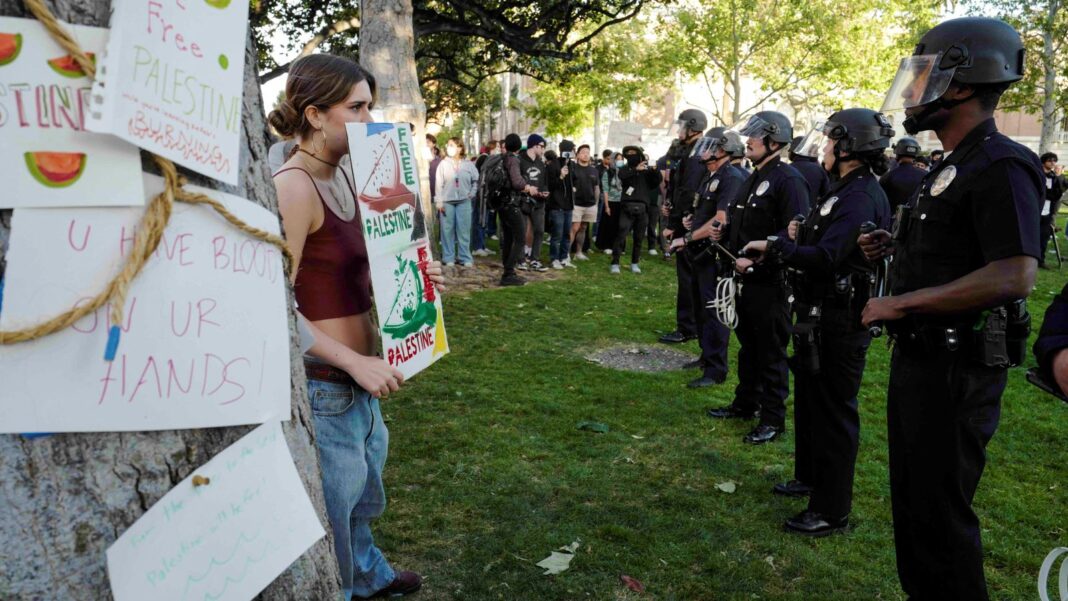Protests over the Israel-Hamas war have reached boiling point at US universities, leading to the arrests of hundreds of protesters on campuses across the country.
Police have been involved in clashes with pro-Palestinian protesters who have set up encampments on dozens of campuses, with over 500 arrests being made.
But what are their demands, how have things escalated and where have people been arrested? Here’s what’s happened so far.
What are the protests about?
The message from the students in encampments has been simple: they want their universities to stop doing business with Israel – or any companies that support its ongoing war in Gaza.
The demand has its roots in the Boycott, Divestment and Sanctions movement, a decades-old campaign against Israel’s policies toward the Palestinians.
But the specifics vary from each set of protesters at different universities. Among them are these key demands:
• Stop doing business with military weapons manufacturers that are supplying arms to Israel
• Stop accepting research money from Israel for projects that aid the country’s military efforts
• Be more transparent about what money is received from Israel and what it’s used for
• Stop investing college endowments with money managers who profit from Israeli companies or contractors.
Endowments are the holdings and investments that institutions of higher education, foundations and some nonprofits manage as a kind of perpetual savings account.
Please use Chrome browser for a more accessible video player
3:20
Heated scenes on campus
On many campuses, students pushing for these changes say they don’t know the extent of their university’s connections to Israel. Universities with large endowments spread their money across a vast array of investments, making it challenging to identify where it all lands.
Read more:
Student anti-Israel protests continue to sweep the US
University campus protests encapsulate a moment of febrile divisiveness
Universities are required to report gifts and contracts through foreign sources, but the government has long said these sources are “massively underreported”.
Around 100 US colleges have reported gifts or contracts from Israel totaling $375m (£300m) over the past two decades, according to the Education Department database.
There have also been pro-Israel counter protests on several campuses, with some Jewish students saying the protests have veered into antisemitism and made them feel unsafe on their university’s premises.
What sparked the protests?
The mass protests escalated dramatically across the country after students set up a tent encampment at Columbia University in New York on Wednesday 17 April, demanding the school divest from companies they claim “profit from Israeli apartheid”.
It was a strategy a small group of pro-Palestinian student activists had been planning for months, though one of them, Columbia graduate student Elea Sun, said a lot of the subsequent protesting has been heavily improvised.
“There’s been a lot of work, a lot of meetings that went into it, and when we finally pulled it off, we had no idea how it would go,” they said. “I don’t think anyone imagined it would take off like it did.”
Police tried to clear the encampment on 18 April, arresting 108 protesters in the process. But those arrests have proved an inspiration for other students across the country and motivated protesters at Columbia to regroup.
There has been some coordination in the country-wide protests, as students at Columbia held a phone call with around 200 other people interested in starting their own camps at other universities ahead of the week commencing 22 April.
Please use Chrome browser for a more accessible video player
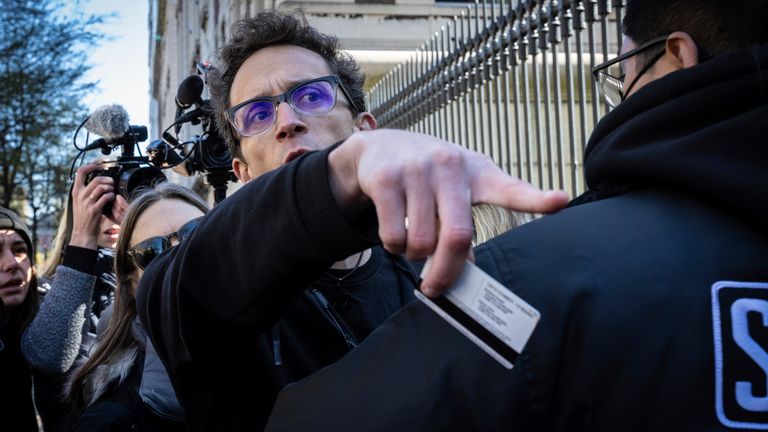
2:48
The early days of Columbia University protest
But they haven’t been orchestrated by one particular movement; most have been put together by separate student groups. In many cases, various student groups at one university have banded together to put the protests together.
Here is a summary of where major protests have led to arrests so far:
New York University (NYU)
More than 100 students and staff were arrested at NYU on 22 April.
Officers moved on the crowds shortly after they set the demonstration a 4pm deadline to disperse, and claimed that protesters were joined by people “whom we believe were not affiliated with NYU”.
Several tents had been set up in the plaza where many were protesting in. A group of pro-Israel counter-protesters had also been in the plaza Monday afternoon.
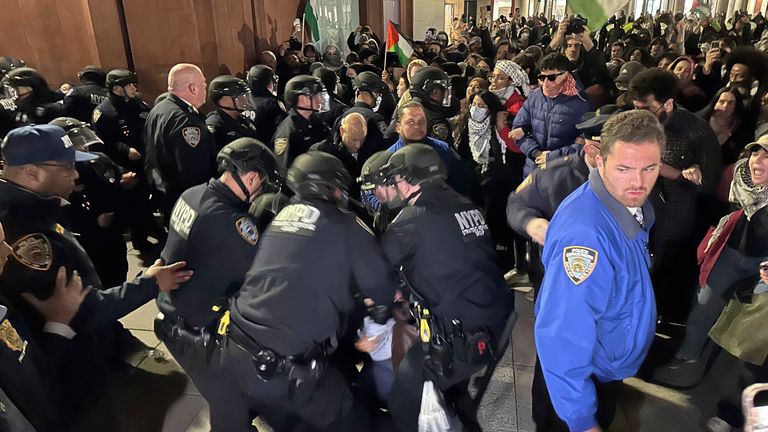
Police tackle protester outside New York University on Monday. Pic: AP
In the evening, a line of university staff members linked arms in front of the protesters to section them off from police before they were arrested and taken away themselves.
A spokesperson for the NYPD confirmed 120 people were taken into custody – 116 of whom were released with summonses for trespass, giving them a future date to appear before a judge or magistrate.
The remaining four were issued with desk appearance tickets for more serious offences – meaning they are required to appear at a criminal court on a future date.
Yale University
Police arrested 48 protesters on 22 April, including four who were not students, after they refused to leave an encampment on a plaza at the centre of the university’s campus in New Haven, Connecticut.
California State Polytechnic University
Students seized two buildings on the university’s campus on 22 April, using furniture, tents, chains and zip ties to block themselves in. Police say three students have been arrested, but the protest is still ongoing and the campus has been forced to close until at least next week.
“Numerous laws have been broken, including resisting arrest, destroying and damaging property, criminal trespass, and more,” a university statement read on Wednesday.
The Ohio State University
About 50 protesters had gathered on campus on 23 April to share stories about their connections to the Palestinian people before marching, an Ohio State spokesperson said.
Two pro-Palestinian students participating in a protest on campus were arrested Tuesday and charged with criminal trespassing, after “repeated warnings to be quiet,” they added.
Emerson College
Protests began on 23 April, when about 80 students and other supporters occupied a busy courtyard on the downtown Boston campus.
College officials on Wednesday warned the students that some of the protesters were in violation of city ordinances, including by blocking a right-of-way and fire hydrants, violating noise laws and setting up tents in an alley owned by the city.
The college said in a statement that campus police were offering escort services for students after officials received credible reports of some protesters engaging in “targeted harassment and intimidation of Jewish supporters of Israel”.
Police said 108 people were arrested in protests around the university on the night of 24 April and four officers suffered non-life-threatening injuries – three minor and one “more serious”. No protesters were injured, they added.
Videos on social media showed police and the pro-Palestinian protesters clashing.
The University of Texas
Police officers and state troopers forcefully arrested 33 students protesters and a local news photographer on 24 April after university officials and the governor called authorities.
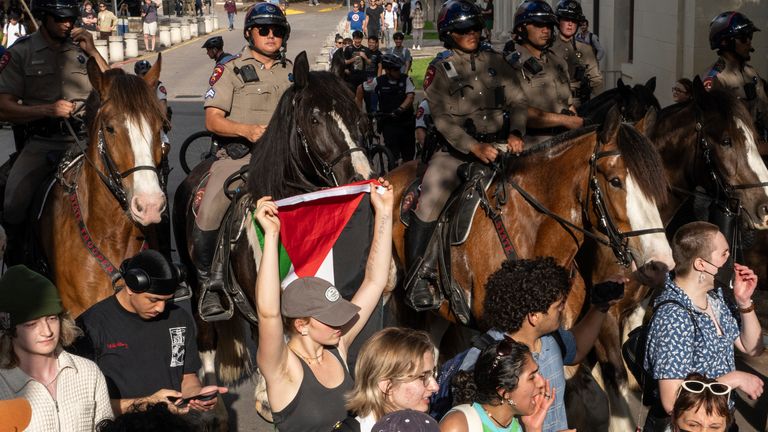
State troopers on horses push back demonstrators at the University of Texas. Pic: AP
Protesters said they had planned a walkout and march to the main campus lawn, where students would occupy the space and host events throughout the afternoon. But the university said in a statement that it would “not tolerate disruptions” like those at other campuses.
University of Southern California
93 people were arrested at the university on the evening of 24 April, the Los Angeles Police Department said, as protests devolved into vandalism and confrontations.
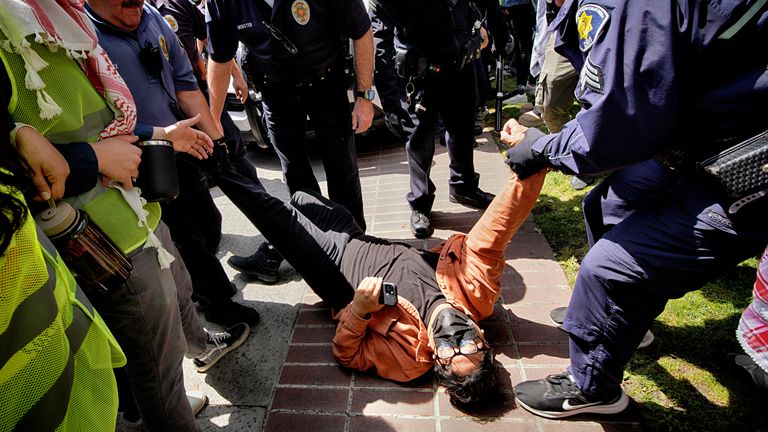
A protester is detained at the University of Southern California. Pic: AP
How are universities dealing with protesters?
Some universities have been negotiating with them, while others have quickly turned to law enforcement to prevent demonstrations from progressing.
Since the 108 arrests at Columbia University on 18 April, the ongoing encampment there has become a calmer place. The university has been speaking to protesters consistently to try and reach an agreement while also working with local authorities and ensuring there is a strong police presence near the encampment.
But other universities have been far less accommodating, with police cracking down on protesters early into demonstrations. After a tent encampment popped up 25 April at Indiana University Bloomington, police with shields and batons shoved into protesters and arrested 33. Hours later at the University of Connecticut, police tore down tents and arrested one person.
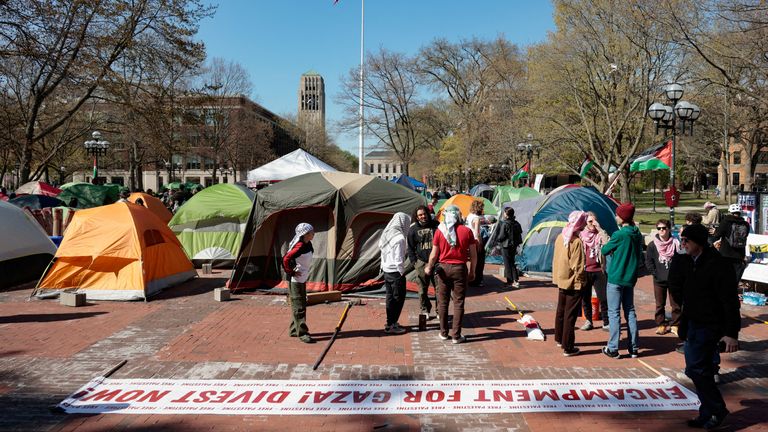
Michigan students at an encampment. Pic: Reuters
On the same night at Ohio State University, police clashed with protesters just hours after they gathered. Those who refused to leave after warnings were arrested and charged with criminal trespass, said a university spokesperson, citing rules barring overnight events.
Pressure is growing on the universities to deal with the protests ahead of graduation ceremonies – most of which are planned for early May. The University of Southern California has already canceled its main ceremony over safety concerns, but most have remained coy.
‘Fine line between free speech and hate speech’
Sky News’ US correspondent Mark Stone has been in New York, watching the protests unfold at NYU.
Summarising the opposing views, he said: “Gaza is the catalyst, Israel is the target.
“It’s clear that positions are entrenched, views are polarised and emotions are very high. Complex issues [are being] condensed to their simplest, most digestible form… so often, nuance lost.
“Even among faculty staff, there is a split in opinion. Some Jewish professors [are] very worried for their safety, others framing this in a very different way.
“There’s clearly a wide spectrum of views here, and by definition that’s going to mean extremism on both sides.
“It also means definitions of antisemitism, of Islamophobia, are distilled and open to interpretation. It is therefore a balance between respecting free speech and restricting it. The fine line between free speech and hate speech.”


